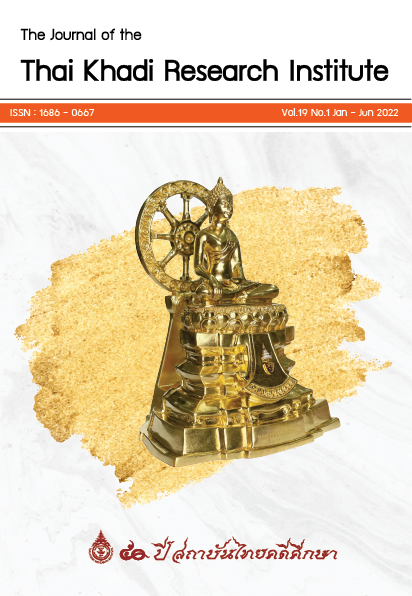ประวัติศาสตร์การศึกษาไทยภายใต้การรวมศูนย์อำนาจของรัฐ (พ.ศ. 2490 - 2562)
Main Article Content
บทคัดย่อ
งานวิจัยนี้มีจุดประสงค์ 2 ประการ นั่นคือ เพื่ออธิบายพลวัตของระบบการศึกษาของไทยผ่านนโยบายการศึกษาที่เน้นการรวมศูนย์อำนาจ และเพื่อแสดงให้เห็นถึงประวัติศาสตร์ของความพยายามปฏิรูปการศึกษาของรัฐไทย งานวิจัยนี้เป็นงานวิจัยเชิงคุณภาพใช้วิธีการทางประวัติศาสตร์โดยศึกษาผ่านการใช้เอกสารชั้นต้นและชั้นรอง ผลการวิจัยพบว่า ตั้งแต่ พ.ศ. 2490 - 2562 นั้นสังคมไทยอยู่ภายใต้รัฐบาลที่มาจากการรัฐประหารที่มีกลไกการปกครองที่รวมศูนย์อำนาจอยู่ที่หัวหน้าคณะรัฐประหาร และสภานิติบัญญัติแห่งชาติที่ไม่ยึดโยงกับประชาชนในประเทศ การธำรงอำนาจของคณะรัฐประหารแสดงให้เห็นภาวะรวมศูนย์อำนาจอย่างชัดเจนและที่สำคัญการครองอำนาจการรวมศูนย์เป็นไปอย่างยาวนานกว่าครึ่งหนึ่งของขอบเขตการวิจัย ลักษณะดังกล่าวจึงส่งผลต่อระบบการศึกษาไทยทั้งระบบไปด้วย ช่วงสำคัญ 2 ช่วงที่สะท้อนได้ดีถึงการรวมศูนย์อำนาจที่ส่งผลต่อการศึกษา ได้แก่ การครองอำนาจอย่างยาวนานของคณะรัฐประหารนั่นคือ ช่วง พ.ศ. 2500 - 2516 และ พ.ศ. 2557 - 2562 แวดวงการศึกษาถูกกระชับอำนาจเพื่อสร้างแผนการใหญ่และขับเคลื่อนประเทศ โดยไม่เปิดโอกาสให้ประชาชนมีส่วนร่วมสร้างฉันทามติทางการศึกษาร่วมกัน การเพิ่มอำนาจในการควบคุมพลเมืองในระบบการศึกษาด้วยระเบียบวินัยบนเรือนร่างก็เข้มข้นมากขึ้น ดังนั้นระบบการศึกษาที่รวมศูนย์นี้จึงเลี่ยงไม่พ้นที่จะต้องพิจารณามิติทางการเมืองที่มีบทบาทอย่างเข้มข้นไปด้วย
Downloads
Article Details

อนุญาตภายใต้เงื่อนไข Creative Commons Attribution-NonCommercial-NoDerivatives 4.0 International License.
ผู้เขียนจะต้องลงนามในแบบฟอร์มรับรองบทความ เพื่อให้คำยืนยันความรับผิดชอบว่า บทความของผู้เขียนนั้นไม่เคยตีพิมพ์ที่ใดมาก่อน พร้อมรับทราบว่า กระบวนการส่งบทความเข้าพิจารณาและตีพิมพ์ในวารสารไทยคดีศึกษานั้น จะไม่มีการเรียกเก็บค่าใช้จ่ายในการดำเนินการ ยกเว้น ในกรณีที่ผู้เขียนขอยกเลิกการตีพิมพ์บทความในวารสารไทยคดีศึกษาไม่ว่าด้วยสาเหตุใด และหลังจากบทความนั้นเข้าสู่กระบวนการพิจารณาของผู้ทรงคุณวุฒิไปแล้ว ผู้เขียนจะต้องรับผิดชอบต่อค่าใช้จ่ายที่เกิดขึ้นในกระบวนการประเมินเป็นจำนวนเงิน 3,000 บาท (สามพันบาทถ้วน)
เอกสารอ้างอิง
Buakamsri, T. (2009). กัมพูชาในแบบเรียนของไทย [Cambodia in Thai text]. Bangkok: Matichon.
Champung, P. (1996). ความคิดเห็นของผู้บริหารการศึกษาและผู้บริหารสถานศึกษา เกี่ยวกับนโยบายปฏิรูปการศึกษาด้านระบบบริหารการศึกษา ตามโครงการปฏิรูปการศึกษาของกระทรวงศึกษาธิการ [Opinions of educational administrators and school administrators concerning the education reform policy in the area of educational administrative system according to the education reform project, ministry of education]. (Master of Education’s thesis, department of Educational Administration, graduate school, Chulalongkorn university).
Eaksittipong, S. (2018). บททดลองนำเสนอว่าด้วยพัฒนาการอุดมศึกษาไทยภายใต้สงครามเย็น: กำเนิดวงวิชาการไทย นักวิชาการชาตินิยมและชาตินิยมทางปัญญา ภายใต้เงาอินทรี [A Preliminary Studies on the Development of Thai Higher Education in the Cold War Context: The Rise of Thai Academia, Nationalist Scholarsand Intellectual Nationalism under the Eagle’s Shadow]. INTHANINTHAKSIN JOURNAL, 13(2), 60 - 87.
Faire, P. (2016). การศึกษาของผู้ถูกกดขี่ [Pedagogy of the Oppressed]. Bangkok: Jumping fish.
Jaktreemongkol, U. (2015). การพัฒนามาตรประเมินค่านิยมหลัก 12 ประการ สำหรับผู้เรียนอายุระหว่าง 12 - 14 ปี [A construcation of assessment scales of the 12 core values for the 12 - 14 years old students]. Research paper, National Institute of Educational Testing Service (Public Organization).
Kitirianglarp, K. (2018). แผนที่สร้างชาติ [Map for building a Nation]. Bangkok: Illuminations Editions.
Kitirianglarp, K. (2019). เขียนชนบทให้เป็นชาติ กำเนิดมานุษยวิทยาไทยในยุคสงครามเย็น [Writing rural to be a Nation]. Bangkok: Matichon.
Lao, R. (2015). A Critical Study of Thailand's Higher Education Reforms: The culture of borrowing, London and New York: Routledge.
Laungaramsri, P and Siriphon, A. (2015). ย้อนพินิจการประกันคุณภาพอุดมศึกษา ด้านสังคมวิทยาและมานุษยวิทยา [Analyzing the Educational Quality Assurance in Sociology and Anthropology]. Chiang Mai: Faculty of Social Sciences, Chiang Mai University.
Ministry of Education. (2001). หลักสูตรการศึกษาขั้นพื้นฐาน พุทธศักราช 2544 [Basic Curriculum B.E. 2544]. Bangkok: Ministry of Education.
Nawarat, N. (2018). การศึกษาของผู้หญิง ตัวตนและพื้นที่ความรู้ [Women’s education: Identity and knowledge space] (3rd ed.). Chiang Mai: Friedrich - Ebert Foundation.
Nunbhakdi, E. (2015). การทำงานของทีดีอาร์ไอในการเมืองไทย [The Workings Of TDRI In Thai Politics]. (Dissertation for Philosophy in Political Science, Faculty of Political Science, Thammasat university).
Office of the Higher Education Commission. (2020). ประวัติทบวง มหาวิทยาลัย [History of Ministry of University Affairs]. Retrieved May 20, 2020, from http://www.mua.go.th/history.html.
Office of the National Economic and Social Development Board. (2020). จำนวนผู้สำเร็จการศึกษา จำแนกตามระดับและประเภทการศึกษา ปีการศึกษา 2535 - 2559 [Numbers of graduates classifying toward levels and types of education]. Retrieved May 27, 2020, from http://social.nesdc.go.th/SocialStat/StatReport_Final.aspx?reportid=3609&template=3R1C&yeartype=M&subcatid=23.
Osatharom, W. (1981). การศึกษาในสังคมไทย พ.ศ. 2411 - พ.ศ. 2475 [Education in Thai society 1868 - 1932]. (M.A.’s thesis in History, Department of History, Chulalongkorn university).
Pipatrojanakamol, S. (2004). การวิเคราะห์เชิงนโยบายการก่อรูปและกระบวนการตราพระราชบัญญัติการศึกษาแห่งชาติ พ.ศ. 2542 [An analysis of policy formation and legislative process of the National Education Act B.E. 2542]. (Dissertation for Philosophy in Education Administration, department of education policy, graduate school, Chulalongkorn university).
Potjanalawan, P. (2013). กาลเทศะในวันเด็กแห่งชาติ และความเป็นเด็กในพลเมืองไทยยุคพัฒนา [Time and space in national Children day and chlidness in Thai citizen in Development era]. Art and culture magazine, 34, 3.
Prachachat. (2018). เรียนครู “4 ปี” หรือ “5 ปี” หลักสูตรไหนได้ “คุณภาพ” มากกว่า? [Four or five - year curriculum, which is better quality?]. Retrieved May 9, 2020, from https://www.prachachat.net/education/news-244000.
Premsote, S. (2008). โรงเรียนกวดวิชา ปัจจัยที่ห้าของครอบครัวยุคใหม่ [Tutoring school: The 5th Basic Necessity For Living of new family]. Retrieved May 20, 2020, from https://www.sarakadee.com/2008/11/01/tutor.
Rajjakijjanubeksa. (1959). September 2, Volume 76.
Rajjakijjanubeksa. (1962). November 23, Volume 89.
Rajjakijjanubeksa. (1980). October 13, Volume 97.
Rajjakijjanubeksa. (1981). January 23, Volume 98.
Rajjakijjanubeksa. (1992). April 2, Volume 109.
Rajjakijjanubeksa. (2002). December 13, Volume 119.
Rajjakijjanubeksa. (2003). July 13, Volume 120.
Rajjakijjanubeksa. (2007). January 9, Volume 124.
Rajjakijjanubeksa. (2008). September 25, Volume 124.
Rajjakijjanubeksa. (2009). October 14, Volume 125.
Rajjakijjanubeksa. (2010). October 14, Volume 126.
Rajjakijjanubeksa. (2011). September 28, Volume 127.
Rajjakijjanubeksa. (2012). February 8, Volume 129.
Rajjakijjanubeksa. (2013). September 30, Volume 129.
Rajjakijjanubeksa. (2014). October 11, Volume 130.
Rajjakijjanubeksa. (2015). September 30, Volume 131.
Rajjakijjanubeksa. (2016). March 21, Volume 133.
Rajjakijjanubeksa. (2016). September 25, Volume 132.
Rajjakijjanubeksa. (2017). April 6, Volume 134.
Rajjakijjanubeksa. (2017). September 23, Volume 133.
Rajjakijjanubeksa. (2018). October 2, Volume 134.
Rajjakijjanubeksa. (2019). September 17, Volume 135.
Rajjakijjanubeksa. (2020). February 26, Volume 137.
Sinlarat, P. et al. (2007). อิทธิพลทางการศึกษาของต่างประเทศที่มีต่อการจัดการศึกษาของไทย [The Study of foreign educational impacts on Thai educational management]. Research paper, faculty of Education, Chulalongkorn university.
Tangkijvanich, S. et al (2013). การจัดทำยุทธศาสตร์การปฏิรูปการศึกษาขั้นพื้นฐานให้เกิดความรับผิดชอบ [Making the strategy of basic education reformation for responsibility]. Research paper presenting to Office of the Basic Education Commission, Thailand Development Research Institute Foundation.
Tanosawan, U. & Ponprachatam, S. (2010). การศึกษา: มายาการความรุนแรงเชิงวัฒนธรรม [Education: cultural violence illusion]. Satha-Anand, C. (ed.), ความรุนแรงซ่อน / หาสังคมไทย [Violence Hide / Seek Thai society]. Bangkok: Matichon.
Tupprasert, P. (1985). การวิเคราะห์เชิงประวัติศาสตร์เกี่ยวกับการจัดการศึกษาภาคบังคับของไทย [Historical analysis of practices in Thai compulsory education]. (Master of Education’s thesis, department of Foundations of Education, graduate school, Chulalongkorn university).


